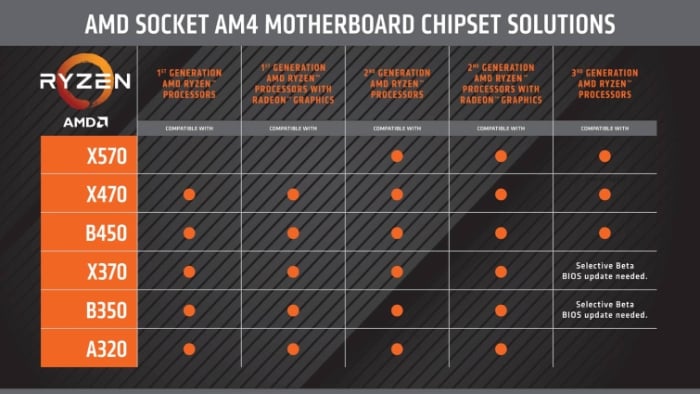AMD Promises Ryzen 3000 Zen 2 CPU Performance Parity Across X570, X470, And B450 Motherboards
However, what many enthusiasts want to know is how will these new Ryzen 3000 processors perform on older motherboards. We already know that third-generation Ryzen 3000 processors are officially supported on X470 and B450 motherboards. In addition, motherboards running the X370 and B350 chipsets will also support the new processors with a "Selective Beta BIOS Update".
Now, PCGamesN is confirming that enthusiasts will get the exact same performance from Ryzen 3000 processors on older X470 and B450 motherboards as they would with the newer X570-based alternatives. “Just because the X570 exists and just because the X570 is the most advanced chipset you can get in 2019, that doesn’t mean that the B450 or X470 chipsets are no longer relevant,” said Donny Woligroski, who is a member of AMD's enthusiast desktop marketing team.
"It makes a lot of sense to look at those lower-tier boards like the X470 and B450, which will offer the same performance on those third-generation Ryzen processors as the X570 will.”
In other words, for gamers that are perfectly content with their current X470 or B450 motherboard, you can rest assured that you'll be getting peak CPU performance if you upgrade to a new Ryzen 7 3700X or Ryzen 3800X processor. That's not to say that X570 motherboards don't offer their own set of advantages. The primary motivator for upgrading from a X470, for example, to an X570 motherboard is the inclusion of PCIe 4.0 on the latter. AMD's Radeon RX 5700 Navi graphics cards make use of the PCIe 4.0 interface and will only perform optimally on X570 motherboards.

In addition, there will be a wave of new PCIe 4.0 SSDs on the way in the coming months that will only offer optimal performance with X570 motherboards. Since Computex 2019, we've seen offerings from Corsair, Gigabyte, and MSI. All of these SSDs trounce their PCIe 3.0 counterparts with sequential read/write speeds approaching 5GB/sec.




